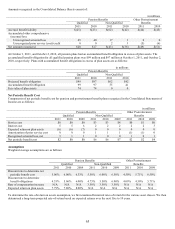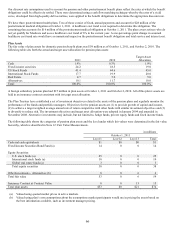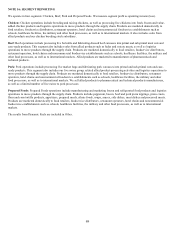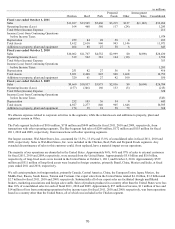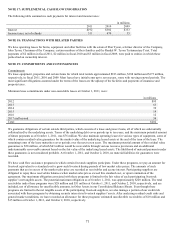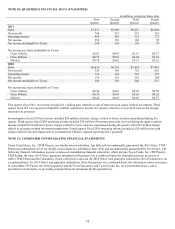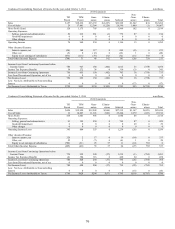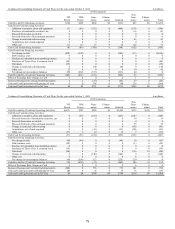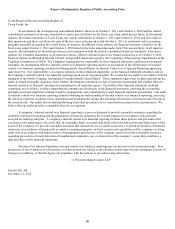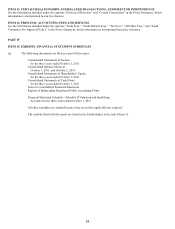Tyson Foods 2011 Annual Report Download - page 74
Download and view the complete annual report
Please find page 74 of the 2011 Tyson Foods annual report below. You can navigate through the pages in the report by either clicking on the pages listed below, or by using the keyword search tool below to find specific information within the annual report.74
We and the other defendants have denied liability, asserted various defenses, and filed a third-party complaint that asserts claims
against other persons and entities whose activities may have contributed to the pollution alleged in the amended complaint. The
district court has stayed proceedings on the third party complaint pending resolution of Oklahoma’s claims against the defendants. On
October 31, 2008, the defendants filed a motion to dismiss for failure to join the Cherokee Nation as a required party or, in the
alternative, for judgment as a matter of law based on the plaintiffs’ lack of standing. This motion was granted in part and denied in
part on July 22, 2009. In its ruling, the district court dismissed Oklahoma’s claims for cost recovery and for natural resources damages
under CERCLA and for unjust enrichment under Oklahoma common law. This ruling also narrowed the scope of Oklahoma’s
remaining claims by dismissing all damage claims under its causes of action for Oklahoma common law nuisance, federal common
law nuisance, and Oklahoma common law trespass, leaving only its claims for injunctive relief for trial. On August 18, 2009, the
Court granted partial summary judgment in favor of the defendants on Oklahoma’s claims for violations of the Oklahoma Registered
Poultry Feeding Operations Act. Oklahoma later voluntarily dismissed the remainder of this claim. On September 2, 2009, the
Cherokee Nation filed a motion to intervene in the lawsuit. Its motion to intervene was denied on September 15, 2009, and the
Cherokee Nation filed a notice of appeal of that ruling in the Tenth Circuit Court of Appeals on September 17, 2009. A non-jury trial
of the case began on September 24, 2009. At the close of Oklahoma’s case-in-chief, the Court granted the defendants’ motions to
dismiss claims based on RCRA, nuisance per se, and health risks related to bacteria. The defense rested its case on January 13, 2010,
and closing arguments were held on February 11, 2010. On September 21, 2010, the Court of Appeals affirmed the district court’s
denial of the Cherokee Nation’s motion to intervene. On October 6, 2010 the Cherokee Nation and the State of Oklahoma filed a
petition for rehearing or en banc review seeking reconsideration of this ruling. The Court of Appeals denied this petition.
On May 8, 2008, a lawsuit was filed against the Company and two of our employees in the District Court of McCurtain County,
Oklahoma styled Armstrong, et al. v. Tyson Foods, Inc., et al. (the Armstrong Case). The lawsuit was brought by a group of 52
poultry growers who allege that certain of our live production practices in Oklahoma constitute fraudulent inducement, fraud, unjust
enrichment, negligence, gross negligence, unconscionability, violations of the Oklahoma Business Sales Act, Deceptive Trade
Practice violations, violations of the Consumer Protection Act, and conversion, as well as other theories of recovery. The plaintiffs
sought damages in an unspecified amount. On October 30, 2009, 20 additional growers represented by the same attorney filed a
lawsuit against us in the same court asserting the same or similar claims, which is styled Clardy, et al. v. Tyson Foods, Inc., et al. (the
Clardy Case). In both of these cases we have denied all allegations of wrongdoing. In June 2009, the plaintiffs in the Armstrong case
requested an expedited trial date for a smaller group of plaintiffs they claimed were facing imminent financial peril. The Court
ultimately severed a group of 10 plaintiffs from the Armstrong Case, and a trial began on March 15, 2010. There were numerous
irregularities and rulings during the trial which we believe to have been legally erroneous and highly prejudicial to our right to a fair
trial. On April 1, 2010, the jury returned a verdict against us and one of our employees, and on April 2, 2010, the jury returned a
punitive damages verdict against us. After a dispute caused by inconsistencies between the multiple verdict forms completed by the
jury and apparent confusion by the jury as to how to complete those verdict forms, the Court entered a final judgment in the amount of
$8,655,735. Subsequent to the trial, the presiding judge disqualified from the cases and the Oklahoma Supreme Court appointed a new
judge to the cases. The Company filed post-trial motions challenging the verdict. Those motions were denied. The Company has
appealed the verdict to the Oklahoma Supreme Court. We filed a motion with the trial court to change venue from McCurtain County
on the grounds that the numerous irregularities that occurred during the trial, coupled with the attendant publicity, resulted in
community bias which would prevent the Company from receiving a fair trial in McCurtain County. The trial court granted this
motion and the case will be transferred to Choctaw County, Oklahoma. We filed another motion, which the trial court also granted, to
stay all future trials of the claims of the plaintiffs in the Armstrong Case and the Clardy Case pending the outcome of the appeal of the
first trial. We also filed a motion to sever all of the plaintiffs’ claims into individual cases, which was heard on January 25, 2010. This
motion was denied, but the Court took under advisement the sizes and groupings of plaintiffs in future trials. We believe numerous
and substantial legal errors were made by the Court during the trial and that a review of and guidance on these issues by the appellate
court could have a substantial impact on the outcome of future trials in the Armstrong Case and the Clardy Case.



